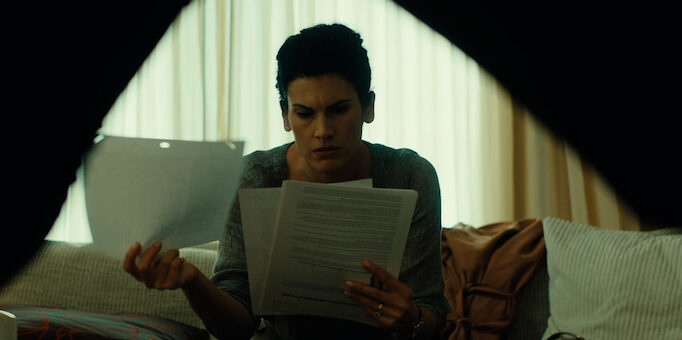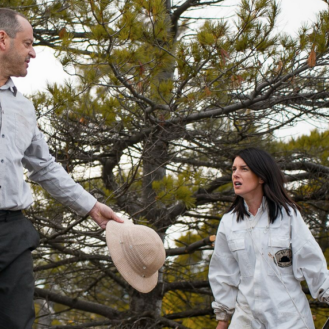Protocol 7 answers that scenario that we’ve all played out in our head – what if a doctor made a Hollywood legal thriller? Director Andy Wakefield, a former physician and documentarian who is also an adamant anti-vaccine activist, makes his feature-length narrative debut with Protocol 7. The movie may fare better than his menacing doc, Vaxxed: From Cover-Up to Catastrophe, but that’s also damning with faint praise.
Protocol 7 is a whistleblower tale following an alleged, controversial cover-up at Merck laboratories that involved a faulty MMR vaccine being distributed that wasn’t in line with updated guidelines. The information was leaked by Merck insiders who felt their integrity was being compromised; leading to a case accusing Merck of corporate fraud. In the film, lawyer Lexi Koprowski (Rachel G. Whittle) feels as if she’s stepping outside of her comfort zone by pursuing the case against Merck. But, she’s unwavering due to her passionate personal connection to the subject matter – her adopted son being diagnosed with autism after being vaccinated. Lexi is also assisted by disgraced medical professional, Dr. Jay. Dr. Jay is played by Matthew Marsden, recently seen in Amazon Prime Video’s Reacher series, but the character feels as if it’s supposed to be adjacent to Wakefield. Marsden is also photographed as a hunk in Protocol 7 as he sprouts off pages of exposition and research while practicing various yoga positions and, at one point, caught in the nude by a bashful Lexi. While these chuckles may have been unintended, they did serve to be slight distractions from the film’s problematic plot delivery.
The way Wakefield delivers information is suspicious. The end credits of Protocol 7 assures audiences that they have the choice to choose what to believe about the legitimacy of vaccines, followed by Wakefield throwing every single graph and statistic at the wall to see what sticks with movie goers. He claims to be open-minded, but that isn’t conveyed well in his work as a filmmaker since the movies are still packaged in a certain way to push a strong, heavy-handed opinion. For instance, his portrayals of autism: as a documentarian, Wakefield inappropriately framed autism like it was a version of a zombie apocalypse. The portrayal is no different in Protocol 7, as we watch Lexi and her husband, Josh (R. Brandon Johnson), struggle with their son Ishal (Christopher Robert Scott, a cute kid who seems to have been given the direction to zone out or flail around when not being directly used in a scene).
While the clunkiness of Protocol 7 didn’t quite work for me, I would rather have Andy Wakefield stick to making this type of movie rather than a documentary. A narrative like this plays towards the audience’s need to be entertained by embellished details like over-the-top scenarios (a PTA meeting that turns into a witch hunt, all because of Lexi’s opinions on mandatory vaccines) and cornball line deliveries (“You don’t have an autistic kid.” “No, not yet.”). There are not enough of these moments to call Protocol 7 “unintentionally funny” or a “guilty pleasure”, and the director is probably thankful for that. To give credit where credit is due: the actors are good despite the material not measuring up to their efforts, the atmospheric comparisons to Steven Soderbergh’s Traffic fit the multi-arc jumping, and Wakefield finds a way to deliver bulky bits of information during final courtroom exchanges that matches the formality of these scenes. Kind of like how Quentin Tarantino would be criticized for how his characters all sound like him….so, he made Inglourious Basterds where practically every character was subtitled.
Since Protocol 7 can’t be completely redeemed as an informative or thoroughly engaging feature, it sits statically on the screen as a dry, wishy-washy dramatic reenactment.
**********
Do You Tweet? Follow These Tweeple:
Addison Wylie: @AddisonWylie





Be the first to comment